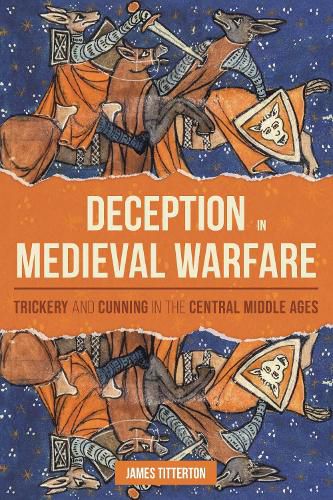Readings Newsletter
Become a Readings Member to make your shopping experience even easier.
Sign in or sign up for free!
You’re not far away from qualifying for FREE standard shipping within Australia
You’ve qualified for FREE standard shipping within Australia
The cart is loading…






Deception and trickery are a universal feature of warfare, from the Trojan horse to the inflatable tanks of the Second World War. The wars of the Central Middle Ages (c. 1000-1320) were no exception. This book looks at the various tricks reported in medieval chronicles, from the Normans feigning flight at the battle of Hastings (1066) to draw the English off Senlac Hill, to the Turks who infiltrated the Frankish camp at the Field of Blood (1119) disguised as bird sellers, to the Scottish camp followers descending on the field of Bannockburn (1314) waving laundry as banners to mimic a division of soldiers. This study also considers what contemporary society thought about deception on the battlefield: was it a legitimate way to fight? Was cunning considered an admirable quality in a warrior? Were the culturally and religious other thought to be more deceitful in war than Western Europeans? Through a detailed analysis of vocabulary and narrative devices, this book reveals a society with a profound moral ambivalence towards military deception, in which authors were able to celebrate a warrior’s cunning while simultaneously condemning their enemies for similar acts of deceit. It also includes an appendix cataloguing over four hundred incidents of military deception as recorded in contemporary chronicle narratives.
$9.00 standard shipping within Australia
FREE standard shipping within Australia for orders over $100.00
Express & International shipping calculated at checkout
Deception and trickery are a universal feature of warfare, from the Trojan horse to the inflatable tanks of the Second World War. The wars of the Central Middle Ages (c. 1000-1320) were no exception. This book looks at the various tricks reported in medieval chronicles, from the Normans feigning flight at the battle of Hastings (1066) to draw the English off Senlac Hill, to the Turks who infiltrated the Frankish camp at the Field of Blood (1119) disguised as bird sellers, to the Scottish camp followers descending on the field of Bannockburn (1314) waving laundry as banners to mimic a division of soldiers. This study also considers what contemporary society thought about deception on the battlefield: was it a legitimate way to fight? Was cunning considered an admirable quality in a warrior? Were the culturally and religious other thought to be more deceitful in war than Western Europeans? Through a detailed analysis of vocabulary and narrative devices, this book reveals a society with a profound moral ambivalence towards military deception, in which authors were able to celebrate a warrior’s cunning while simultaneously condemning their enemies for similar acts of deceit. It also includes an appendix cataloguing over four hundred incidents of military deception as recorded in contemporary chronicle narratives.